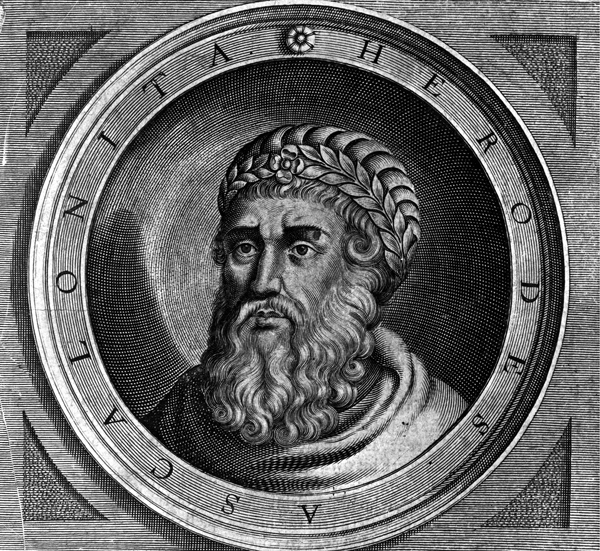 | |||
| Herod the Great http://www.notablebiographies.com/images/ uewb_05_img0337.jpg |
When asked when Jesus was born most people in the west would say December
25th and if you ask people in the east they would answer January 6th,
but they would both be wrong.[1] The error in dating was
caused by Dionysius Exiguus, a Roman monk-mathematician who made a numerical error
in the calculation for the date of the nativity (753rd year from the founding of
Rome instead of
749 which is when Herod died).[2]
Most scholars understand
the date of Jesus’ birth to be between 6 and 4 BC.[3] We know that Herod the Great died in the spring of 4 BC[4] and was present during the
visit of the Magi at the nativity (Matt 2:1). Josephus tells us that Herod died
after a lunar eclipse (Josephus Ant. 17.6.4) and before the springtime Passover of the Jews.[5]
It is known that there were
four lunar eclipses between 7 and 1 BC. They are on the 23rd of
March, 5 BC with 29 day between the eclipse and Passover; on the 15th of
September, 5 BC with 7 months between the eclipse and Passover; on the 13th
of March 4 BC with 29 days between the eclipse and Passover and on the 10th
of January, 1 BC with 12.5 weeks between the eclipse and Passover.[6] Most scholars favor 4 BC[7] placing the birth of Jesus in ca. 6 BC while a few have challenged this
date[8] preferring 1 BC for the
eclipse that is mentioned by Josephus and placing the birth of Jesus in 3 or 2 BC. This later date has been
challenged by Barnes and Johnson who again favor the 4 BC date.[9]
Maier argues for “late 5 BC as the most probable
time for the first Christmas.”[10] The early Church Father,
Clement of Alexandria (ca. 200 AD), gives a date for the birth of
Jesus according
to the Egyptian calendar (25 Pachon or May 20th;
Strom. 1.21) which according to the Gregorian
calendar converts to the 14th of May, 6 BC.
[1] Paul L. Maier, In the Fullness of
Time: A Historian Looks at Christmas, Easter, and the Early Church,
Rev Updated (Grand Rapids, Mich.: Kregel, 1998), 24.
[2] Ibid., 25.
[3] Dunn, Jesus Remembered, 324; Jack Finegan, E. Jerry Vardaman, and Edwin M.
Yamauchi, eds., Chronos, Kairos,
Christos (Winona Lake, Ind.: Eisenbrauns, 1989), 97–117; Kenneth E. Bailey, Jesus Through Middle
Eastern Eyes: Cultural Studies in the Gospels (Downers Grove, Ill.: IVP Academic, 2008).
[4] Timothy David Barnes, “The Date of Herod’s Death,”
JTS 19, no. 1 (1968): 204–219; P. M. Bernegger, “Affirmation of
Herod’s Death in 4 B.C.,” JTS 34, no. 2 (1983): 526–531.
[5] Mark Kidger, The Star of
Bethlehem: An Astronomer’s View
(Princeton, N.J.: Princeton University Press, 1999), 46.
[6] Ibid., 48–49;
Manfred Kudlek and Erich H. Mickler, Solar and Lunar
Eclipses of the Ancient Near East from 3000 B.C. to 0 with Maps
(Neukirchen-Vluyn: Butzon & Bercker, 1971).
[7] Harold W. Hoehner, “The Date of the
Death of Herod the Great,” in Chronos, Kairos, Christos, ed. Jack
Finegan, Jerry Vardaman, and Edwin M. Yamauchi (Winona Lake, Ind.: Eisenbrauns, 1989),
101–32; Emil Schürer, The History of the Jewish People in the Age of Jesus Christ (175 BC–AD 135), ed. G. Vermes, F.
Miller, and M. Black, Rev (Edinburgh, U.K.:
T&T Clark, 1979), 1:326–28 n. 165; F. F. Bruce, New Testament History, 2d ed. (New York, N.Y.: Doubleday,
1980), 23.
[8] Ernest L. Martin, “The Nativity and Herod’s
Death,” in Chronos, Kairos, Christos, ed. Jack Finegan, Jerry Vardaman, and Edwin M. Yamauchi (Winona Lake, Ind.: Eisenbrauns, 1989), 86; W.
E. Filmer, “The Chronology of the
Reign of Herod the Great,” JTS 17 (1966): 283–98.
[9] Barnes, “The Date of Herod’s Death,”
204–209; Douglas Johnson, “The Star of Bethlehem Reconsidered: A Refutation of the
Mosley/Martin Historical Approach,” Planetarian 10,
no. 1 (1981): 14–16.
[10] Paul L. Maier, “The Date of the Nativity
and the Chronology of Jesus’ Life,” in Chronos,
Kairos, Christos, ed. Jack Finegan, Jerry Vardaman, and Edwin M. Yamauchi (Winona Lake, Ind.: Eisenbrauns, 1989), 113.

No comments:
Post a Comment